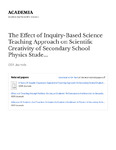| dc.contributor.author | Gathage, Kunga | |
| dc.contributor.author | Embeywa, Henry | |
| dc.contributor.author | Koech, Peter | |
| dc.date.accessioned | 2022-09-23T06:07:15Z | |
| dc.date.available | 2022-09-23T06:07:15Z | |
| dc.date.issued | 2021-03 | |
| dc.identifier.issn | 2279-0837 | |
| dc.identifier.uri | http://ir.mksu.ac.ke/handle/123456780/14084 | |
| dc.description.abstract | The present study was prompted by the consistent posting of dismal performance in Physics in Kenya in general
and Kitui County in particular as shown by the annual KNEC reports on KCSE performance for the period
2014-2019. The study set out to investigate the effect of Inquiry-Based Science Teaching Approach on learners’
scientific creativity of secondary school physics students in Kitui County, Kenya. The guiding objective was to
establish the difference in Scientific-Creativity between students taught using Inquiry Based Science Teaching
Approach and those taught using the conventional methods. The study was anchored on both the Constructivist
and the Self-Determination Theory. It adapted a mixed methodology and a Quasi Experimental Research Design
and in particular the Solomon’s Four Non-Equivalent Control Group Research Design. The target population
was 1600. A sample size of 160 respondents was used. Purposive and Stratified random sampling techniques
were used to selectthe study participants. The research instrument used was a students’ scientific observation
schedule with a reliability coefficient of 0.723. Descriptive analysis was done by use of frequencies, means,
standard deviation and percentage while the inferential analysis used the Analysis of Variance, and the Least
Significant Difference (LSD) technique at a significance level of coefficient alpha α=0.05. The findings showed
a statistically significant difference in scientific creativity between students taught using IBSTA and those
taught using conventional methods. The study concludes that IBSTA is effective in improving students’ selfconcept. The key recommendation of the study is the creation of an enabling environment for IBSTA adoption
in schools. | en_US |
| dc.language.iso | en_US | en_US |
| dc.publisher | IOSR Journal of Humanities And Social Science (IOSR-JHSS) | en_US |
| dc.subject | Conventional Teaching Approach | en_US |
| dc.subject | Critical Thinking | en_US |
| dc.subject | Inquiry Based Science | en_US |
| dc.subject | Teaching Approach | en_US |
| dc.subject | Learning outcome | en_US |
| dc.subject | Scientific Creativity | en_US |
| dc.title | The Effect of Inquiry-Based Science Teaching Approach on Scientific Creativity of Secondary School Physics Students in Kitui County, Kenya | en_US |
| dc.type | Article | en_US |

